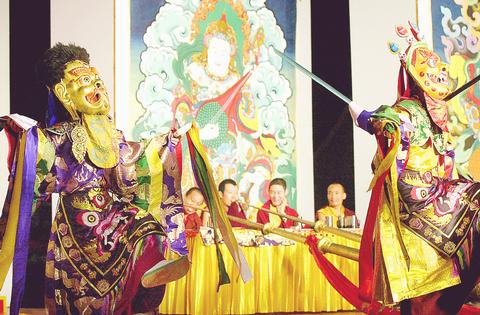The world's biggest Tangka, or hand-painted painting of the Buddha, will appear at Taipei's Ta-an Park this morning in an activity called "Sunning the Buddha " (曬大佛). It is the centerpiece of a three-day Tibetan cultural festival which began last night.
The painting is around 14.5m high and 9m wide and was painted over four months by 34 artists, who used more than 20,000 pieces of gold foil. The Tangka was officially recognized by the Guinness World of Records on March 16 as being the largest in the world.
Lamas representing four sects of Tibetan Buddhism will jointly greet the Tangka and display outside as the high point of the festival.

PHOTO: CHEN CHENG-CHANG, TAIPEI TIMES
"Sunning the Buddha" is a traditional ritual. Tibetans traditionally place a huge painting or embroidery of the Buddha on the slope of a hill, so lamas and laypersons can pay their respects to the Buddha. Apart from the Tangka, a huge Tibetan tent able to accommodate 200 people will also be displayed in the park.
Other aspects of Tibetan culture, such as the religious dance known as the Chambon, the Lingka folk festival, folk songs, the ritual "flowers dropping on the Buddha"(花雨浴佛), traditional foods and costumes available for the public to borrow to wear will also be on display.
"Tibetan culture equals Buddhist culture," said Chueh-An-Tsering (
Great public interest in Tibetan Buddhism and cultures prompted the commission and the Taipei City Government to hold the festival, the largest Tibetan cultural activity ever to be held in Taiwan.

CHIP WAR: The new restrictions are expected to cut off China’s access to Taiwan’s technologies, materials and equipment essential to building AI semiconductors Taiwan has blacklisted Huawei Technologies Co (華為) and Semiconductor Manufacturing International Corp (SMIC, 中芯), dealing another major blow to the two companies spearheading China’s efforts to develop cutting-edge artificial intelligence (AI) chip technologies. The Ministry of Economic Affairs’ International Trade Administration has included Huawei, SMIC and several of their subsidiaries in an update of its so-called strategic high-tech commodities entity list, the latest version on its Web site showed on Saturday. It did not publicly announce the change. Other entities on the list include organizations such as the Taliban and al-Qaeda, as well as companies in China, Iran and elsewhere. Local companies need

CRITICISM: It is generally accepted that the Straits Forum is a CCP ‘united front’ platform, and anyone attending should maintain Taiwan’s dignity, the council said The Mainland Affairs Council (MAC) yesterday said it deeply regrets that former president Ma Ying-jeou (馬英九) echoed the Chinese Communist Party’s (CCP) “one China” principle and “united front” tactics by telling the Straits Forum that Taiwanese yearn for both sides of the Taiwan Strait to move toward “peace” and “integration.” The 17th annual Straits Forum yesterday opened in Xiamen, China, and while the Chinese Nationalist Party’s (KMT) local government heads were absent for the first time in 17 years, Ma attended the forum as “former KMT chairperson” and met with Chinese People’s Political Consultative Conference Chairman Wang Huning (王滬寧). Wang

CROSS-STRAIT: The MAC said it barred the Chinese officials from attending an event, because they failed to provide guarantees that Taiwan would be treated with respect The Mainland Affairs Council (MAC) on Friday night defended its decision to bar Chinese officials and tourism representatives from attending a tourism event in Taipei next month, citing the unsafe conditions for Taiwanese in China. The Taipei International Summer Travel Expo, organized by the Taiwan Tourism Exchange Association, is to run from July 18 to 21. China’s Taiwan Affairs Office spokeswoman Zhu Fenglian (朱鳳蓮) on Friday said that representatives from China’s travel industry were excluded from the expo. The Democratic Progressive Party government is obstructing cross-strait tourism exchange in a vain attempt to ignore the mainstream support for peaceful development

ELITE UNIT: President William Lai yesterday praised the National Police Agency’s Special Operations Group after watching it go through assault training and hostage rescue drills The US Navy regularly conducts global war games to develop deterrence strategies against a potential Chinese invasion of Taiwan, aimed at making the nation “a very difficult target to take,” US Acting Chief of Naval Operations James Kilby said on Wednesday. Testifying before the US House of Representatives Armed Services Committee, Kilby said the navy has studied the issue extensively, including routine simulations at the Naval War College. The navy is focused on five key areas: long-range strike capabilities; countering China’s command, control, communications, computers, cyber, intelligence, surveillance, reconnaissance and targeting; terminal ship defense; contested logistics; and nontraditional maritime denial tactics, Kilby